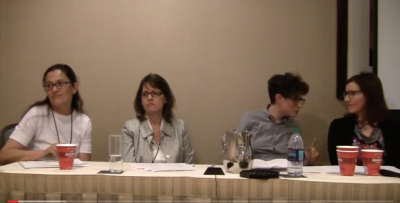6. Sexism, misogyny and heteronormativity in Italian legal and media language. The case of “Stupro della fortezza da Basso.”
by Michela Baldo
Michela Baldo introduces the theme of the AAIS 2016 roundtable, that is those discourses of gender and sexuality circulating in Italy oriented in a homophobic, transphobic, sexist and misogynist way, but also the ways in which language can become a tool to fight discrimination. The author subsequently introduces queer linguistics, a branch of linguistics that aims to challenge essentialist, hegemonic and naturalized notions of gender and sexuality, and that can be useful in unmasking the work of heteronormativity in the formation of public discourses.



